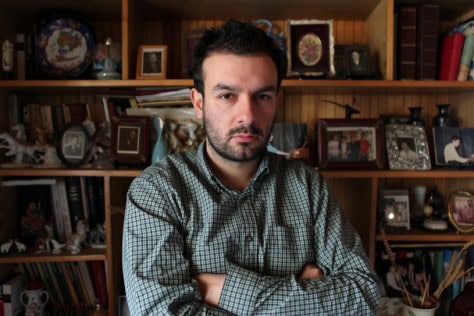DFA Records is on a major—and completely deserved—ascension to worldwide musical domination. Beginning as a quasi-tongue-in-cheek label, DFA is pumping out stellar records at an astounding pace, throwing killer parties, and now branching out to the European music scene with the imprint Death From Abroad.
DFA is releasing a two-disc compilation entitled Nobody Knows Anything tomorrow that's very much worth looking into. The thing is a collection of tunes that were previously put out on Berlin's Supersoul Recordings, a staple of heavy electronic and techno. It was founded in 2006 by Xaver Naudascher and is home to a handful of great acts that are grossly under-appreciated and overlooked in the States.
We chatted with Naudascher and two of his roster members about the compilation, their music, Supersoul, and everything else in between. Buy the double-disc right here, stream a sample track in the media player to the right, and download it, too!
What inspired you to make a record label in 2006? You've been in several groups and have been playing for years… so what made it congeal into a label then?
Naudascher: The main reason to start a label was that I didn't want to be at the mercy of somebody else when it comes to decide what is worth releasing and what not. Originally it was intended for my own material or collaborations with other producers only but when i stumbled across Walter Jones' stuff and found out he wasn't being released properly by anybody i had to take action.
Also i realized that i couldn't find enough new records i liked to keep my DJ sets fresh so i started hunting for unreleased music i liked.
New record labels tend to focus more on the charisma and lifestyle they articulate rather than the bands they sign. That is, we will always trust D.F.A. despite who or what they sign; we will always adore Rong despite not knowing every name or picking up every white label. How do you approach the business of owning and operating a label today and how do you sustain it‹and make it bigger?
Naudascher: Early Virgin Records and Elektra had a similar vibe but with a more pop approach. In the end you want a label that filters out the good stuff and makes it available to you. I always work non-exclusively with artists as I don't want everything they do, I only want the great stuff. Nobody can churn out gem after gem. Said that as an artist myself i don't want to put a leash on them by signing their material and then not releasing it. Of course this method bears the risk of missing out on some stuff but so far I managed to create a certain bond of trust with the artists so they will first come to me. As for my own work I am my own judge and only a fraction of what i produce sees the light of day.
The techno vibe of the compilation is pretty heavy and seems a little out of left-field for American sensibilities—but in a very good way! What do you think the aesthetic differences between Stateside and European dance music listeners are and why is 2008 the time to drop this mega release, in your mind?
Naudascher: If you look at music that exists outside the Top 40, Europe and the U.S. are not that different. People that care about music regardless of a genre/label you can find all over the world which is why some bands the mainstream has never heard of manage to mobilize a very solid fan base worldwide. I find it very funny that most people in Europe have never heard of Garth Brooks even though he has sold
over 160 million records. The people here know Johnny Cash because he moved listeners outside the Top 40 formula. Even though my music may seem a galaxy away from Mr. Cash's music it's motivation and the place within yourself where it originates are more related than one might think.
Daze from Plastique De Reve: Personally, I don't find the compilation “heavy” at all! It's more a present-day blend of “softer” styles like Italo, acid house, electro…
In a general way I think techno is probably more widespread in Europe nowadays, in terms of number of producers and listeners, labels, clubs, and variety of styles alike, so in a way it's more “developed,” both in quantity and quality. We also seem to party differently. From my own limited experience of playing in the States, I'd say that Europe has a real techno scene, not just poser “lounges” that close at 2 AM! In Europe, people dance till they die; in the States they wiggle a bit, check if it's the right place to be seen at, and then drive home. (If the place doesn't get busted!) Sounds a little exaggerated, but on some occasions that's how it felt…
Bård from Skatebård: Thank you. Yes, it's techno, but it's musical techno. This compilation is a strong manifest of the beauty of no compromise, uniqueness, originality and making your own trend. There have been just to many bland compilations of “jazzy” and “funky” house in the last ten years. And it's about time for people to grow tired of this electro-house sound that's been dominating the last two years. That's just so 2007… I'm not saying this because I'm an important asshole, but I'd like people to hear something that can give them more meaning in their life. Luckily you have alternatives. May I also recommend the Kompakt Total compilations? They're also techno, but with a musical sensibility, sometimes almost pop.
The styles you draw from—Krautrock, Italo Disco, Electro, Chicago House and Detroit Techno—seem to all be really hip at the moment. What has brought these older forms of music back—and in such a big way?
Naudascher: Those styles were never gone. They are still present in a lot of current music. People like Timbaland and Neptunes are certainly not oblivious to those styles. They sprinkle them over their productions
to spice things up. Maybe Supersoul uses a less diluted form of drawing from it, concentrating on the more “techno” or repetitive side of it if you like. All my fellow producers on Supersoul are very in touch with current music and we always look at what's happening in the pop market with great interest
(and often slight disgust too) but when it comes to music for a dance floor we always come back to exploring the roots of electronic dance music (basically the styles mentioned in your question). Said that we all try to look ahead instead of dwelling in pure nostalgia.
Daze from Plastique De Reve: I think it's just a normal thing, after nearly 40 years of electronic dance music, more people discover or rediscover some of its roots or “hidden areas,” producers (of my generation, at least) naturally fuel that into their music, and the beat goes on… For me, these styles were never “in” or “out,” just different “sensibilities” appearing at different moments within the larger current of electronic dance music. They are probably all bound to re-appear or again disappear at some point thanks to their particular qualities, but without ever getting real “mainstream” attention again (if they ever had any), at least not in their true original form.
Bård from Skatebård: I don't know, haven't they been hip always? Or maybe that's just with the nerds… but yes, it has become more legit to say that you're inspired by all of them. It's not many years ago that the baldhead bang-bang techno dudes would refuse that any techno had been inspired by European synth-pop and Italo-disco, for example. What has brought the styles back, all at once, owes a lot to the CBS Radio, which has started a movement, and [a great] many records have been reprinted/bootlegged because of radio play there. CBS has done a lot to equal the status of both Italo-disco, Detroit techno, Chicago house and electronica. At the same time, there had to be a reaction to all the minimal techno without melody and chords. And now even trance is coming back, but in a sophisticated way, not the cheesy horror trance from 1999…
Every city has such character and the best ones have a unique sound and sonic aesthetic. What is it about Berlin—as opposed to maybe L.A. or London or Tokyo—that produces this heavier, ravier stuff right now?
Naudascher: I know of people in L.A., Tokyo and London that like a similar sound to ours influenced by the very same music. Musically I feel closer to people in Den Haag, Rotterdam and N.Y. than in Berlin. The majority of parties going on in Berlin bore me to tears. We have great clubs location-wise but only every now and then there's somebody playing that i feel is worthwhile going to hear. The best DJs we have in town are ND Baumecker (resident of Panoramabar), Boris (also Panobar), Sebo K, Filippo Moscatello aka DJ Naughty and Paul Mogg (my music partner and one half of Psychonauts). One thing they have in common is that they have profound knowledge of music (not only dance music) and are open to more than one music style at a time when playing. Variety within reason is the key to a good party.
The compilation is a chance to discover on one CD all the previous Supersoul releases, that were so far available only on vinyl.
Daze from Plastique De Reve: I don't know, I'm Swiss! What's the sound of Switzerland? Living in Berlin today… in my view, the scene here is not that “heavy,” it's actually been completely dominated by soft, pointless, boring, minimal techno, for years now! It's “ravier,” for sure, due to the late night club culture here, and there's always been a heavier trend in Germany in general, but I don't think we (the Supersoul artists) are actually representative of a “hard” scene—at all. Hopefully we stand somewhere else, eons away in outerspace, away from the minimal snobs, the Rocky Horror electro-clashers, the nu-rave tektonik stoops and the “schranz-techno” retards… and get to bring (back, in some cases) some of the best electronic dance music around and keep on giving it a good name.
Bård from Skatebård: I must state that I live in Bergen, Norway, a country which has about as many inhabitants as Berlin. For me it's about escaping from earth, and into another galaxy in deep space. Of course that's pretty hard, practically, so the music must help you project your thoughts into cosmos.
About Berlin, I think the hardness of the music comes from the roughness of the club scene, it's pretty raw and dirty… none of the trendy clothes and haircuts you see in London, for example. It's more like the illegal raves from fifteen years back. But still, it's absolutely about the now in Berlin, not [about the] nostalgic and retro.
 Q&A with Larry Gus
Q&A with Larry Gus We Own the Night: The Edison
We Own the Night: The Edison
No Comments